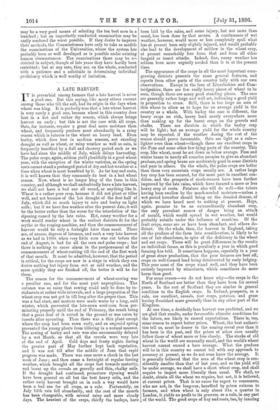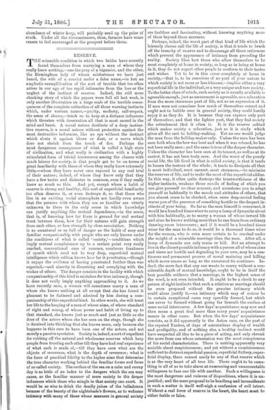A LATE HARVEST.
-IT is proverbial among farmers that a late harvest is never a good one. But this saying, like many others current among those who till the soil, had its origin in the days when wheat was king. It is perfectly true that a late wheat harvest is very rarely a good one, because wheat in this country does best in a hot and rather dry season, which always brings harvest on early ; but this is not the case with all crops. Oats, for instance, require a great deal more moisture than wheat, and frequently produce most abundantly in a rainy season which is ruinous to the wheat on heavy land. Even barley, which does best in medium seasons, not standing drought as well as wheat, or rainy weather as well as oats, is frequently benefited by a dull and showery period such as we have had since the middle of July, which delays harvesting. The pulse crops, again, seldom yield plentifully in a good wheat year, with the exception of the winter varieties, as the spring sorts cannot stand a prolonged period of dry and hot weather at a time when wheat is most benefited by it. As for hay and roots, it is well known that they commonly do best in a bad wheat season. Now, wheat is no longer king of the farm in this country, and although we shall undoubtedly have a late harvest, we shall not have a bad one all round, or anything like it. Wheat is a rather poor crop, because it did not plant or tiller well, and not because of the hot drought of the first half of July, which did so much injury to oats and barley on light soils ; but if we have fine weather after the present date, it will be the better rather than the worse for the retardation of the ripening caused by the late rains. Hot, sunny weether for a week would render wheat in the earliest districts fit for the scythe or the reaping-machine, and then the commencement of harvest would be only a fortnight later than usual. There are, of course, degrees of lateness, and such a very late harvest as we had in 1860, when very little corn was cut before the end of August, is bad for all the corn and pulse crops ; but there is nothing to cause alarm in the postponement of the commencement of wheat-cutting till the end of the first week of that month. It must be admitted, however, that the period is critical, for the crops are now in a stage in which they can derive nothing but injury from wet or cold weather, and the more quickly they are finished off, the better it will be for them.
The season for the commencement of wheat-sowing was a peculiar one, and for the most part unpropitious. The autumn was so rainy that sowing could only be done by in- stalments at rather wide intervals, and a large proportion of the wheat crop was not got in till long after the proper time. This was a bad start, and matters were made worse by a long, cold winter, which prevented the late-sown seed-corn from ger- minating properly until the end of February, the result being that a great deal of it rotted in the ground or was eaten by insects after sprouting. Thus there was a thin plant except where the crop had been sown early, and an ungenial spring prevented the young plants from tillering in a normal manner. The sowing of barley and oats was also unseasonably delayed by a wet March, so that all the cereals were very late at the end of April. Cold days and frosty nights during the greater part of May further kept back vegetation, and it was not till after the middle of June that rapid progress was made. There was once more a check in the last week of June ; and then came a fortnight of regular forcing weather, which brought all the crops fast towards maturity, and burnt up the cereals on gravelly and thin, chalky soils. If the drought had continued, premature ripening would have been general on all but the beat heavy soils, and the rather early harvest brought on in such a way would have been a bad one for all crops, as a rule. Fortunately, on July 12th rain fell abundantly, and the rest of the month has been changeable, with several rainy and more cloudy days. The heaviest of the crops, chiefly the barleys, have been laid by the rains, and some injury, but not more than usual, has been done by that means. A continuance of wet weather, however, would more or less completely spoil what has at present been only slightly injured, and would probably also lead to the development of mildew in the wheat crop, at present remarkably free from that and from all other fungoid or insect attacks. Indeed, fine, sunny weather has seldom been more urgently needed than it is at the present time.
The appearance of the crops in all the most important corn- growing districts presents the same general features, and reports from other parts of the country tally with our own observations. Except in the fens of Lincolnshire and Cam- bridgeshire, there are few really heavy pieces of wheat to be seen, though there are many good standing pieces. The ears are generally rather large and well set, indicating a good yield in proportion to straw. Still, there is too large an area of thin wheat to allow us to hope for an average yield in the country as a whole. With barley the case is different, the heavy crops on rich, heavy land nearly everywhere more than making up for the burnt crops on the gravels and chalks. There are districts in which the barley crop will be light ; but an average yield for the whole country may be expected, if the weather during the rest of the season should prove favourable. Oats are light as a rule— lighter even than wheat—though there are excellent crops in the Fens and some other low-lying parts of the country. This crop, like wheat, must be set down as below average. Peas and winter beans in nearly all counties promise to give an abundant produce, and spring beans are moderately good in some districts and poor in others. On the whole, the pulse crops are better than these very uncertain crops usually are. A rather large hay crop has been secured, for the most part in excellent con- dition, and the prospects of stock-owners have been further improved by the late rains, which have insured a more or less heavy crop of roots. Potatoes also will do well—the tubers having been swollen by the much-needed moisture—unless a wet period hereafter should bring on the dreaded disease, of which we have heard next to nothing at present. Hops, again, promise to be an extraordinarily abundant crop, the only prevalent source of danger being an attack of mould, which would spread in wet weather, but would probably subside under the influence of sunshine. Of the fruit crops, some are or have been abundant, and others de- ficient. On the whole, then, the harvest in England, taking all the produce of the farm into consideration, is likely to be one of fair abundance, in spite of the deficiency in the wheat and oat crops. There will be great differences in the results on individual farms, as this is peculiarly a year in which good farming has told. It sometimes happens, especially in a year of great straw production, that the poor farmers are best off, crops on well-farmed land being deteriorated by early lodging. This year most of the crops stand well, and they have been entirely improved by stimulants, which sometimes do more harm than good. For some reason—we do not know why—the crops in the North of Scotland are better than they have been for several years. In the rest of Scotland they are similar in general condition to the English crops. In Ireland, prospects, as a rule, are excellent, cereals, root crops, potatoes, and grass having flourished more generally than in any other part of the Kingdom.
At one time, a decidedly lean harvest was predicted, and we are glad that results, under favourable climatic conditions for the future, are likely to exceed expectations. There is, too, some reason to expect better prices. Wheat, the best authori- ties tell us, must be dearer in the coming cereal year than it has been in the past, and the prices of other corn usually follow those of wheat more or less closely. The stocks of old wheat in the world are unusually small, and the world's wheat harvest cannot exceed a bare average. What the produce will be in this country we cannot tell with any approach to accuracy at present, as we do not even know the acreage. It is generally believed that the area of the wheat crop is con- siderably smaller than that of last year, and as the yield will be under average, we shall have a short wheat crop, and shall require to import more liberally than usual. We shall, no doubt, obtain all the wheat we require, but not, it is believed, at current prices. That is no cause for regret to consumers, who are not, in the long-run, benefited by prices ruinous to farmers, and when wheat is only about 31s. a quarter in London, it yields no profit to its growers, as a rule, in any part of the world. The good crops of hay and roots, too, by insuring abundance of winter keep, will probably send up the price of stock. Under all the circumstances, then, farmers have some reason to feel encouraged at the prospect before them.



































 Previous page
Previous page